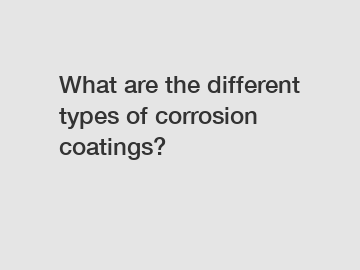What are the different types of corrosion coatings?
Corrosion is a common issue that affects metal surfaces, causing structural damage and reducing the lifespan of various equipment. To combat this problem, corrosion coatings are used to protect metals from environmental factors that promote rust and deterioration. There are different types of corrosion coatings available, each serving specific purposes and offering unique benefits. Understanding the various types of corrosion coatings can help in selecting the most suitable option for specific applications.
**Inorganic Coatings**.
Inorganic coatings are known for their high durability and ability to withstand harsh environments. These coatings are typically made of metallic compounds such as zinc, aluminum, or magnesium. One of the most popular inorganic coatings is galvanizing, which involves applying a layer of zinc to metal surfaces through hot-dip galvanizing or electroplating. This coating provides excellent corrosion protection by forming a protective barrier between the metal substrate and corrosive elements.

**Organic Coatings**.
Organic coatings are made of carbon-based compounds such as polymers, resins, and epoxies. These coatings are commonly used for aesthetic purposes, as they come in a wide range of colors and finishes. Organic coatings provide excellent protection against corrosion, chemicals, and UV radiation. They are also flexible and can be easily applied to complex shapes and structures. Polyurethane, epoxy, and acrylic coatings are popular choices for protecting metal surfaces from corrosion.
**Inhibitor Coatings**.
Inhibitor coatings work by releasing chemicals that neutralize corrosive agents and inhibit the corrosion process. These coatings are often used in conjunction with other types of coatings to provide enhanced protection. Inhibitor coatings can be applied as primers, intermediate coats, or topcoats to prevent rust and degradation of metal surfaces. They are particularly effective in environments with high humidity, saltwater exposure, or chemical exposure.
**Conversion Coatings**.
Conversion coatings are chemically formed on the metal surface to create a protective layer that inhibits corrosion. These coatings typically involve a chemical reaction between the metal substrate and a solution containing compounds such as phosphate or chromate. Conversion coatings improve the adhesion of subsequent coatings and enhance the corrosion resistance of metal surfaces. Phosphate conversion coatings are commonly used for ferrous metals, while chromate conversion coatings are popular for aluminum and other non-ferrous metals.
**Cathodic Protection Coatings**.
Cathodic protection coatings are used to prevent corrosion by applying a sacrificial anode or an impressed current to protect the metal substrate. These coatings work by creating a galvanic cell that directs corrosion away from the metal surface. Cathodic protection coatings are commonly used in marine environments, pipelines, and underground structures to prevent rust and deterioration. Zinc-rich coatings and impressed current systems are examples of cathodic protection coatings that provide long-term corrosion protection.
**Conclusion**.
Choosing the right type of corrosion coating is essential for ensuring the longevity and performance of metal structures and equipment. Understanding the different types of corrosion coatings and their characteristics can help in selecting the most suitable option for specific applications. Whether it is inorganic, organic, inhibitor, conversion, or cathodic protection coatings, each type offers unique benefits and protection against corrosion. By investing in the right corrosion coating, industries can mitigate the effects of rust and deterioration on their valuable assets.
In conclusion, protecting metal surfaces from corrosion is crucial for maintaining the integrity and reliability of equipment and structures. For more information on corrosion coatings or to discuss your specific requirements, please contact us.
The company is the world’s best Visco-elastic anticorrosive tape, Anti corrosion inner wrap tape, Pipeline Butyl Rubber Joint Tape supplier. We are your one-stop shop for all needs. Our staff are highly-specialized and will help you find the product you need.
133
0
0


Comments
All Comments (0)